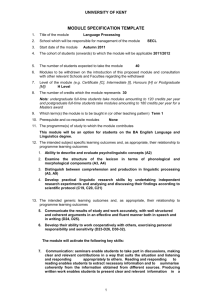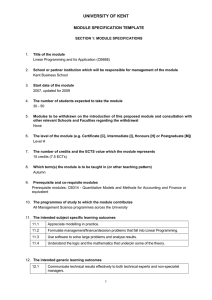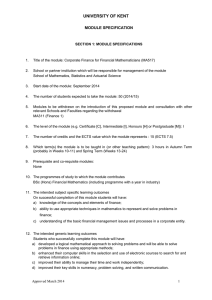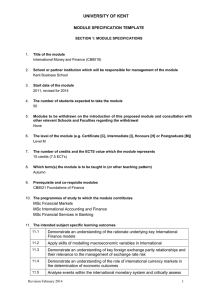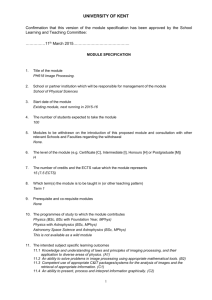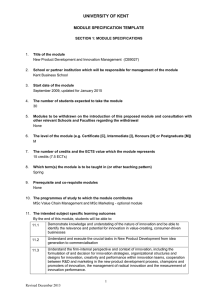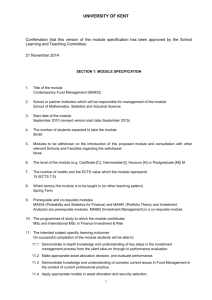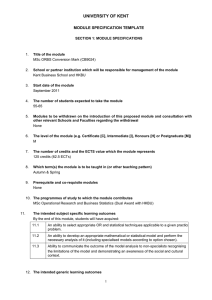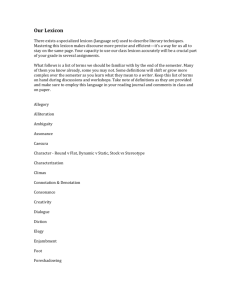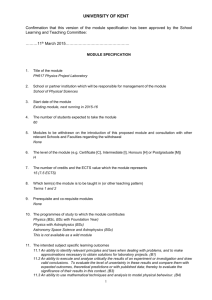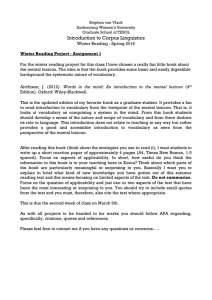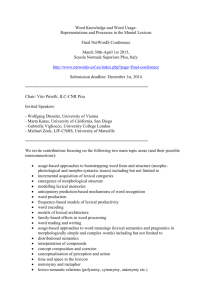University of Kent at Canterbury
advertisement
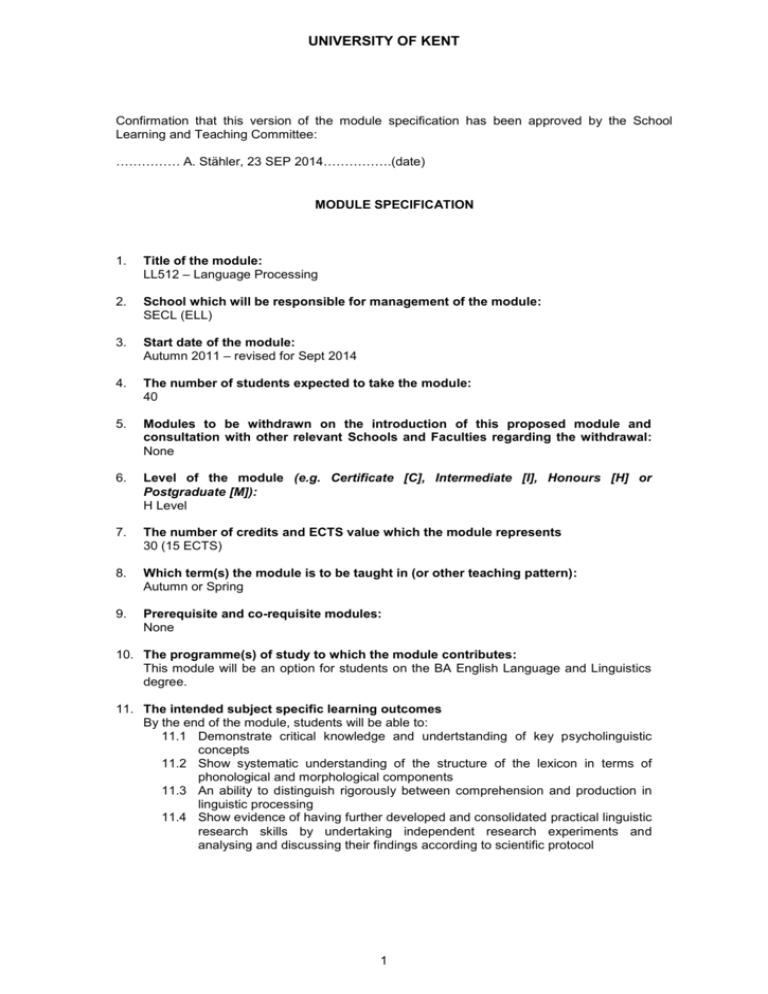
UNIVERSITY OF KENT Confirmation that this version of the module specification has been approved by the School Learning and Teaching Committee: …………… A. Stähler, 23 SEP 2014…………….(date) MODULE SPECIFICATION 1. Title of the module: LL512 – Language Processing 2. School which will be responsible for management of the module: SECL (ELL) 3. Start date of the module: Autumn 2011 – revised for Sept 2014 4. The number of students expected to take the module: 40 5. Modules to be withdrawn on the introduction of this proposed module and consultation with other relevant Schools and Faculties regarding the withdrawal: None 6. Level of the module (e.g. Certificate [C], Intermediate [I], Honours [H] or Postgraduate [M]): H Level 7. The number of credits and ECTS value which the module represents 30 (15 ECTS) 8. Which term(s) the module is to be taught in (or other teaching pattern): Autumn or Spring 9. Prerequisite and co-requisite modules: None 10. The programme(s) of study to which the module contributes: This module will be an option for students on the BA English Language and Linguistics degree. 11. The intended subject specific learning outcomes By the end of the module, students will be able to: 11.1 Demonstrate critical knowledge and undertstanding of key psycholinguistic concepts 11.2 Show systematic understanding of the structure of the lexicon in terms of phonological and morphological components 11.3 An ability to distinguish rigorously between comprehension and production in linguistic processing 11.4 Show evidence of having further developed and consolidated practical linguistic research skills by undertaking independent research experiments and analysing and discussing their findings according to scientific protocol 1 UNIVERSITY OF KENT 12. The intended generic learning outcomes By the end of the module, students will be able to: 12.1 Communicate the results of study and work accurately, with well structured and coherent arguments in an effective and fluent manner both in speech and in writing 12.2 Develop their ability to work cooperatively with others, exercising personal responsibility and sensitivity 12.3 Apply the advanced methods of psycholinguistic analysis learned from the module in other relevant contexts 13. A synopsis of the curriculum This course will focus on the structure of lexical items, the way in which these different lexical items are stored and the nature of the relation between them. Relevant theoretical work in the fields of psycholinguistics and language processing is outlined and discussed. And students will evaluate the efficacy of these theories on the basis of experimental investigations which they themselves will construct and conduct, for example word association experiments, lexicon decision tasks and parsing phenomena. 14. Indicative Reading List Aitchison, J. (2007) Words in the Mind: An Introduction to the Mental Lexicon. Oxford, Basil Blackwell Ltd. Field, J, (2005) Language and the mind. London: Routledge Field, J. (2005) Psycholinguistics: A Resource Book for Students. London: Routledge Harley, Trevor A. (2007) (3rd ed.) The Psychology of Language: From Data to Theory: Psychology Press 15. Learning and Teaching Methods, including the nature and number of contact hours and the total study hours which will be expected of students, and how these relate to achievement of the intended learning outcomes This module will be taught in two sessions, consisting of one lecture and one two hourworkshop. The lecture will address key psycholinguistic theories and concepts (learning outcomes 11.1- 3), while the workshops will provide for practical investigations of the topics introduced in the lectures (learning outcomes 11.4 and 12.1-3). Total number of study hours per week: 300 16. Assessment methods and how these relate to testing achievement of the intended learning outcomes 100% coursework: 1) 2) Proposal (800 words): 20% 3) Presentation of forthcoming experiment: 20% 4) Report (2500words): 60% The proposal and the report will assess students’ knowledge and understanding of the material as well as their ability to conduct experiments with both construct validity and reliability (learning outcomes 11.1-4 and 12.1 & 12.3). the presentation will reflect students’ ability to engage clearly and effectively in oral discussion and argument (learning outcomes 12.1-3). 17. Implications for learning resources, including staff, library, IT and space Large seminars with computer facilities and large whiteboards 18. The School recognises and has embedded the expectations of current disability equality legislation, and supports students with a declared disability or special educational need in its teaching. Within this module we will make reasonable adjustments wherever necessary, including additional or substitute materials, teaching modes or assessment methods for students who have declared and discussed their learning support needs. Arrangements for students with declared disabilities will be made on an individual basis, in consultation with the 2 UNIVERSITY OF KENT University’s disability/dyslexia support service, and specialist support will be provided where needed. 19. Campus(es) where module will be delivered: Canterbury 3
